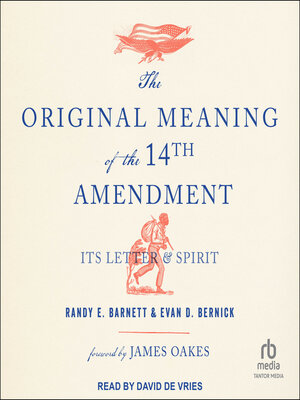The Original Meaning of the Fourteenth Amendment
audiobook (Unabridged) ∣ Its Letter & Spirit
By Randy E. Barnett

Sign up to save your library
With an OverDrive account, you can save your favorite libraries for at-a-glance information about availability. Find out more about OverDrive accounts.
Find this title in Libby, the library reading app by OverDrive.



Search for a digital library with this title
Title found at these libraries:
| Loading... |
Adopted in 1868, the Fourteenth Amendment profoundly changed the Constitution, giving the federal judiciary and Congress new powers to protect the fundamental rights of individuals from being violated by the states. Yet, according to Randy Barnett and Evan Bernick, the Supreme Court has long misunderstood or ignored the original meaning of the amendment's key clauses, covering the privileges and immunities of citizenship, due process of law, and the equal protection of the laws. Antislavery advocates advanced arguments informed by natural rights, the Declaration of Independence, and the common law. Although their arguments lost in the courts, the Republican Party was formed to advance an antislavery political agenda, eventually bringing about abolition. Then, when abolition alone proved insufficient to thwart Southern repression and provide for civil equality, the Fourteenth Amendment was enacted. Finally, Congress used its powers to pass Reconstruction-era civil rights laws that tell us much about the original scope of the amendment. The Original Meaning of the Fourteenth Amendment shows how the principles of the Declaration eventually came to modify the Constitution and proposes workable doctrines for implementing the key provisions of Section 1 of the Fourteenth Amendment.






